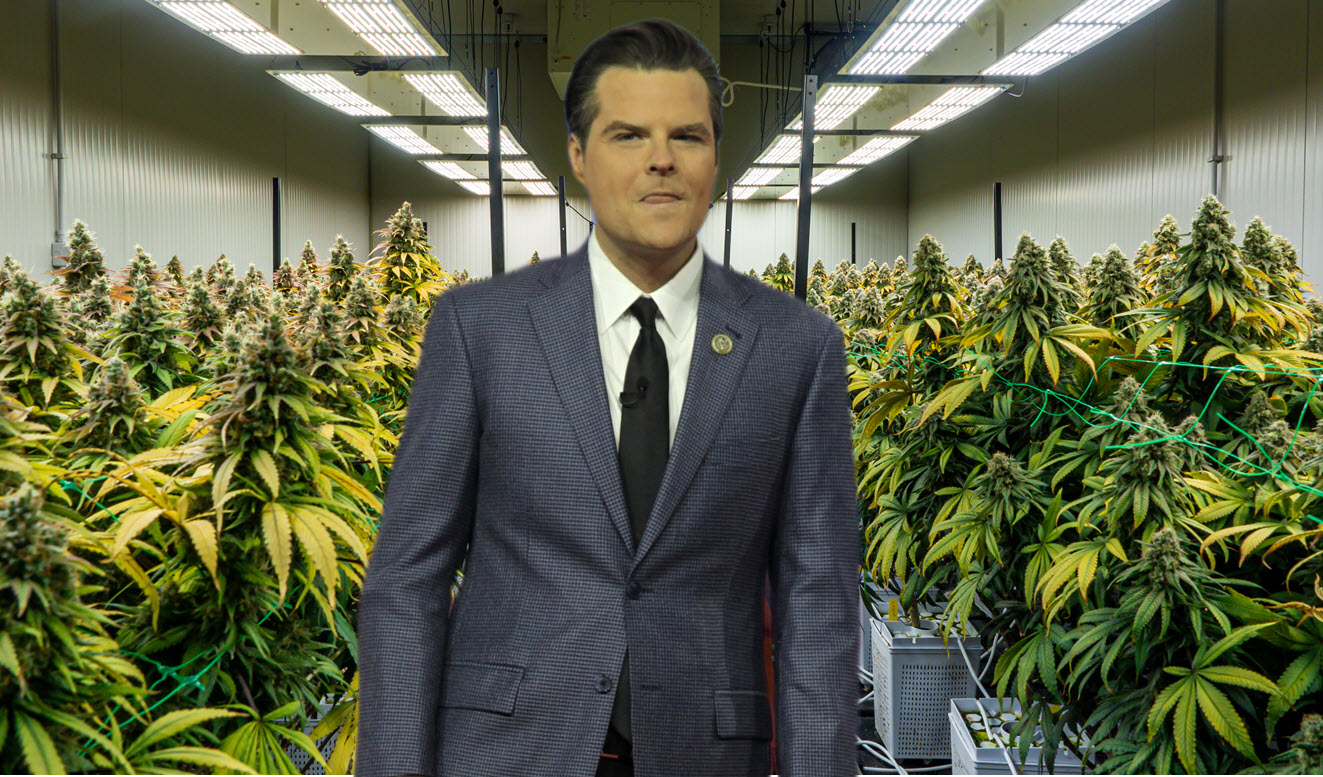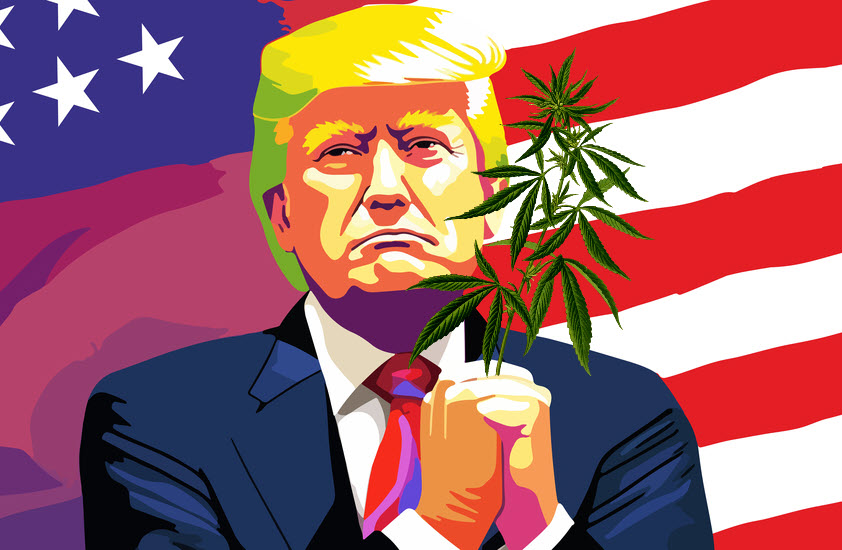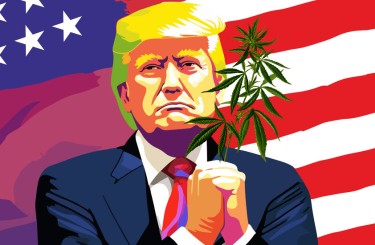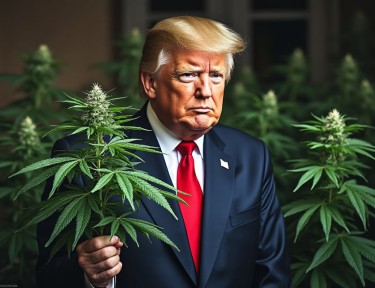Cannabis News
True or False, Matt Gaetz, Trump’s Pick for Attorney General, Will Legalize Marijuana in America?
Published
2 hours agoon
By
admin

The winds of change are blowing through the cannabis landscape once again, and this time they’re coming from an unexpected direction. As we stand on the precipice of what could be a transformative period for cannabis policy in America, the appointment of Matt Gaetz as Attorney General under Trump’s incoming administration has raised both eyebrows and hopes across the cannabis community.
For those who remember the dark days of Jeff Sessions’ tenure as AG, when federal prosecutors were given free rein to interfere with state-legal cannabis operations, Gaetz represents a dramatic shift in perspective. Unlike his would-be predecessor, the Florida congressman has consistently supported cannabis reform, even voting in favor of federal legalization through the MORE Act – a rare stance among his Republican colleagues.
But before we break out the celebratory pre-rolls, it’s worth taking a closer look at what Gaetz’s appointment might really mean for the future of cannabis in America. While some industry veterans fear that any Trump administration will inevitably spell trouble for progress, others see reason for optimism. After all, Gaetz isn’t just cannabis-friendly by Republican standards – he’s been actively pushing for reform throughout his political career, from his time in the Florida legislature to his current role in Congress.
As someone who’s watched the evolution of cannabis policy for years, I find myself intrigued by this unexpected turn of events. Could a Trump-appointed, pro-legalization Attorney General be the key to finally ending federal prohibition? Or will the realities of partisan politics and bureaucratic inertia continue to keep cannabis in legal limbo?
In this article, we’ll dig deep into Matt Gaetz’s background, examine his track record on cannabis policy, and analyze what his potential appointment as Attorney General could mean for the future of legalization in America. Whether you’re a cannabis advocate, industry professional, or simply a curious observer, understanding this pivotal moment in cannabis politics has never been more important.
To be completely honest, before writing this article, I couldn’t have told you much about Matt Gaetz beyond recognizing his name from headlines. As someone who focuses primarily on cannabis policy and its broader societal impacts, I tend to avoid diving too deep into individual political careers. However, given his potential appointment as Attorney General and its implications for cannabis reform, I decided to take a comprehensive, unbiased look at who Matt Gaetz really is.
To achieve this, I compiled information from various sources across the political spectrum – from his own congressional biography to critical media coverage – and analyzed them to build a clearer picture of the man who might become America’s top law enforcement official.
What emerges is a fascinating study in contrasts. On the surface, Gaetz presents as a typical child of privilege turned political firebrand. Born into a wealthy and politically connected Florida family (his father Don Gaetz was a state Senate president and made millions in the healthcare industry), Matt grew up in a house famous for being featured in “The Truman Show” and followed his father’s footsteps into politics.
But dig deeper, and you find someone more complex than the typical MAGA politician he’s often portrayed as. While he’s earned nicknames like the “Trumpiest Congressman” and built his brand on fierce loyalty to Donald Trump, Gaetz has shown surprising independence on certain issues – particularly cannabis reform. As a Florida state representative, he helped draft medical marijuana legislation and has been openly supportive of broader reform efforts, with some former colleagues describing him as a “big-time proponent of marijuana.”
His political record is equally mixed. On one hand, he’s been a vocal advocate for criminal justice reform and cannabis legalization, voting in favor of the MORE Act to end federal prohibition – one of only three Republicans to do so. On the other hand, he’s been a controversial figure, making headlines for everything from storming secure impeachment hearings to facing serious allegations (though ultimately no charges) regarding sexual misconduct.
Personally, Gaetz seems to defy easy categorization. While his public persona is that of a conservative firebrand, his private actions tell a different story. He’s supported same-sex adoption rights, convinced his conservative father to do the same, and quietly raised a Cuban immigrant teenager named Nestor for years before publicly acknowledging their relationship. These actions suggest someone more nuanced than his public image might indicate.
So what does this mean for cannabis reform? Based on his record, Gaetz as Attorney General could actually be a positive development for the legalization movement. Unlike his predecessor Jeff Sessions, who was openly hostile to cannabis reform, Gaetz has consistently supported expanding access and ending federal prohibition. His understanding of the industry and its challenges, combined with his firsthand experience drafting cannabis legislation in Florida, suggests he could be an effective advocate for reform within the administration.
However, there are legitimate concerns. Gaetz’s controversial nature and polarizing personality could make it difficult for him to build the broad coalition necessary to achieve meaningful reform. Additionally, his close alignment with Trump might make some Democratic lawmakers hesitant to work with him, even on issues where they agree.
Rating his potential impact as Attorney General on cannabis reform, I’d give it a cautiously optimistic 7/10. While his personal support for legalization is clear and consistent, his effectiveness will largely depend on his ability to work across the aisle and maintain focus on reform efforts amid the many other responsibilities of his position.
One thing seems certain: having someone who openly supports cannabis reform leading the Department of Justice would be unprecedented. Whether Gaetz can translate that support into meaningful policy change remains to be seen, but at the very least, it suggests that federal cannabis enforcement wouldn’t be a priority under his leadership – and that alone would be a significant shift from previous administrations.
As the cannabis community grapples with the implications of Matt Gaetz’s potential appointment as Attorney General, I think it’s crucial that we all take a collective deep breath before jumping to conclusions. In my years covering cannabis policy, I’ve learned that snap judgments often miss the nuanced reality of political developments – and this situation is no different.
Yes, Matt Gaetz is a controversial figure with his share of personal and political baggage. But then again, who among us doesn’t have flaws? What interests me more than his controversies are the core principles he claims to champion – smaller government, increased personal liberty, and a more rational approach to drug policy. These aren’t just talking points; his voting record on cannabis reform actually backs up these stated beliefs.
Unlike previous Republican AGs who viewed cannabis as a moral evil to be stamped out, Gaetz brings practical experience in crafting marijuana legislation. His involvement in Florida’s medical cannabis program gives him firsthand knowledge of both the challenges and opportunities in creating effective cannabis policy. This experience could prove invaluable in navigating the complex landscape of federal legalization.
Moreover, Gaetz seems to understand something that many politicians miss: the current Schedule III proposal is a half-measure that could potentially do more harm than good. His previous statements expressing concern about Big Pharma’s potential takeover of the cannabis industry suggest he grasps the bigger picture. Perhaps having someone in the AG’s office who understands these nuances could help push us toward more comprehensive reform.
Looking ahead, I’m cautiously optimistic. While Gaetz’s appointment might not be the ideal scenario some cannabis advocates hoped for, it certainly isn’t the doomsday scenario others feared. The momentum behind cannabis reform hasn’t slowed – if anything, it’s accelerating. What we need now is to move past Band-Aid solutions like rescheduling and push for true legalization that serves the interests of both consumers and small businesses.
Whether Matt Gaetz turns out to be a champion for cannabis reform or just another political disappointment remains to be seen. But one thing is clear: the fight for legalization will continue regardless of who holds the position of Attorney General. Our focus should remain on pushing for meaningful reform that addresses the real issues facing the cannabis community – not just reshuffling the deck chairs on the prohibition ship.
The next few years will be crucial for cannabis policy in America. Let’s hope that having someone with actual cannabis policy experience in the AG’s office helps more than it hurts. And if not? Well, we’ve overcome tougher obstacles before.
GAETZ ON WEED POLICY, READ ON…
You may like
-


How MMA And Boxing Are Using CBD
-


Is weed legal in Texas? What you need to know
-


Up and-coming weed tourism hub surprises everyone
-


Weed Hacks – 420-Friendly Travel Tips for the Best Stoner Adventures
-


Consuming Marijuana is Not a Crime in Costa Rica, (Contrary to Some Recent Comments)
-


New frontier welcomes weed into fresh arena
Cannabis News
Another Setback for Recreational Marijuana in Florida…
Published
3 days agoon
November 15, 2024By
admin

In the 2024 election, Florida’s Amendment 3, which sought to legalize recreational marijuana for adults aged 21 and over, garnered 55.9% support —falling short of the 60% supermajority required for constitutional amendments in the state. This outcome has left proponents of marijuana reform contemplating the next steps to achieve legalization.
Understanding the Defeat of Amendment 3
Amendment 3 aimed to permit adults to possess up to three ounces of marijuana and five grams of cannabis concentrate for personal use. It also proposed allowing existing Medical Marijuana Treatment Centers to sell marijuana to adults for recreational purposes.
Despite receiving a majority vote, the amendment did not meet Florida’s stringent 60% threshold for constitutional changes.
Several factors likely contributed to the amendment’s defeat. Governor Ron DeSantis led a robust campaign against the measure by utilizing state funds and significant donations, including $12 million from billionaire Ken Griffin, to fund opposition efforts. The opposition’s messaging focused on concerns about public safety, potential increases in crime, and the societal impact of legalizing recreational marijuana.
Legal Perspectives on the Outcome
Criminal attorney Joshua Padowitz, who has extensive experience in drug-related cases, both as prosecutor and defense attorney, offers insights into the implications of the amendment’s failure. “The defeat of Amendment 3 means that individuals in Florida will continue to face criminal penalties for possession of marijuana, even in small amounts,” Padowitz explains. “This perpetuates a flawed, unjust system where non-violent offenders are subjected to legal consequences that can have lasting effects on their lives.”
Padowitz astutely emphasizes the need for reform, stating, “The current legal framework appears to disproportionately affect minority communities and contributes to the overburdening of our criminal justice system. Legalizing recreational marijuana could alleviate some of these issues by reducing the number of individuals prosecuted and jailed for minor drug offenses. Here in Broward County, Florida, elected State Attorney Harold Pryor has boldly and commendably enacted a policy in his office to not prosecute most minor marijuana possession cases, which effectively discourages law enforcement from pursuing these types of arrests. Unfortunately, Pryor’s forward-thinking directive is not uniform throughout the State of Florida and it remains a criminal offense, subjecting a person to a deprivation of their liberty and a criminal record if convicted.”
Steps Forward for Advocates of Recreational Marijuana
Despite the setback, supporters of marijuana legalization in Florida are exploring various avenues to advance their cause:
-
Legislative Advocacy: Engaging with state legislators to introduce and support bills that decriminalize or legalize marijuana. Building coalitions with lawmakers who recognize the benefits of legalization is crucial.
-
Public Education Campaigns: Informing the public about the benefits of legalization, including economic growth, job creation, and the potential for tax revenue. Addressing concerns about public safety and health through evidence-based information can shift public opinion.
-
Future Ballot Initiatives: Analyzing the shortcomings of Amendment 3 to craft a more comprehensive proposal for future elections. Gathering broader support and ensuring clear, concise language can improve the chances of meeting the 60% threshold.
-
Legal Challenges: Exploring the possibility of challenging existing marijuana laws in court, arguing that they are unconstitutional, outdated, or do not reflect current societal norms and scientific understanding.
The Role of Medical Marijuana Providers
Companies like Trulieve, Florida’s largest medical marijuana operator, have been significant proponents of legalization efforts. Trulieve contributed nearly $145 million to the campaign supporting Amendment 3. Their involvement underscores the potential economic benefits of a legal recreational market.
However, the defeat of Amendment 3 has financial implications for these companies. Following the election, cannabis stocks experienced a sharp decline, reflecting investor disappointment. This economic impact may motivate continued advocacy from industry stakeholders.
Public Opinion and Future Prospects
Public support for marijuana legalization has been growing nationwide. A 2023 Gallup poll indicated that approximately 70% of Americans support legalizing marijuana. In Florida, the 55.9% support for Amendment 3 demonstrates a majority favoring legalization, even if it did not meet the required threshold.
Advocates can leverage this support by mobilizing grassroots campaigns, engaging in community outreach, and highlighting successful legalization efforts in other states. By addressing concerns and presenting a unified, well-organized front, proponents can work towards achieving legalization in future elections.
Concluding Thoughts
The defeat of Florida’s Amendment 3 in the 2024 election is certainly a major setback for proponents of recreational marijuana legalization. However, the majority support it received indicates a shifting perspective among Floridians. By learning from this experience and employing strategic advocacy, public education, and legislative efforts, supporters can continue to push for reform. As attorney Joshua Padowitz encouragingly notes, “Change is often a gradual process, but with persistent effort and a focus on justice and equity, we can move towards a legal framework that reflects the will of the people and the realities of modern society.”
Cannabis News
Margin Compression Madness – $1,000 Fine for Selling Weed at Too Low of a Price?
Published
3 days agoon
November 15, 2024By
admin

A cannabis store in Revelstoke, British Columbia, has been fined $1,000 for selling products at a 50% discount, violating provincial regulations. The Liquor and Cannabis Regulation Branch (LCRB) determined that the sale breached rules against selling cannabis below cost. The penalty was issued following a hearing in October, with the fine due by November 23, 2024. This incident highlights ongoing regulatory scrutiny in the cannabis industry as it navigates complex pricing laws.
The trouble began when Fresh Cannabis Co. Inc., operating as Cost Cannabis, advertised a massive sale on all products and accessories, slashing prices by half. This promotion caught the attention of the LCRB after a complaint was lodged on April 22, 2024. An inspector visited the store just days later to investigate whether the store was indeed selling cannabis below the minimum prices set by the government.
During the inspection on April 25, the inspector asked about four specific products, and staff confirmed that their sale prices were lower than their listed prices. However, when asked for documentation regarding their purchase prices, the store could not provide it at that moment. This lack of transparency raised further concerns.
After a thorough investigation that included requests for sales records and inventory lists, it became clear that Cost Cannabis was selling products below both the price they paid to the provincial distributor and the wholesale price. The LCRB’s ruling emphasized that such practices could lead to public safety issues, including over-consumption and loss of control among consumers.
Regulations surrounding cannabis sales in British Columbia
The regulations surrounding cannabis sales in British Columbia are designed to create a safe and stable market. The LCRB enforces rules that prevent retailers from selling cannabis at prices lower than what they paid to ensure fair competition and consumer safety. These measures aim to deter practices that could lead to over-service or over-consumption of cannabis products.
In this case, Dianne Flood, a delegate from the LCRB, noted that the store should have anticipated that a blanket promotion of 50% off would raise red flags for regulators. She pointed out that there was no evidence showing that Cost Cannabis had taken steps to prevent such violations from occurring.
Cost Cannabis Defense
Faced with the fine, Cost Cannabis admitted to violating minimum pricing rules but argued that these regulations do not effectively prevent over-service or over-consumption. They contended that the persistent presence of an illicit market—where cannabis can be purchased at significantly lower prices—poses a greater risk of unsafe consumption than licensed retailers selling below minimum prices.
The store highlighted that many consumers still turn to unregulated sources for their cannabis needs because of price disparities. They claimed this underground market is often more likely to contribute to public safety issues due to potentially tainted products.
Despite their arguments, Flood concluded that the violation had been proven and imposed a $1,000 fine—the minimum penalty for such an infraction. She stated that first-time violations could result in either a monetary penalty or a short suspension of the business’s license.
Broader Industry Implications
The incident involving Cost Cannabis in Revelstoke, British Columbia, raises significant questions about pricing strategies within the province’s legal cannabis market. As retailers navigate an increasingly competitive landscape, they must find a balance between competitive pricing and regulatory compliance while addressing consumer preferences influenced by a persistent illicit market.
-
The Challenge of Compliance
The fine imposed on Cost Cannabis for selling products at a 50% discount highlights the stringent regulations governing cannabis pricing in British Columbia. Retailers are prohibited from selling cannabis below the price they paid to the government or below the wholesale price. This regulation aims to prevent practices that could lead to over-consumption and protect public safety. However, it also creates challenges for retailers who want to attract customers in a crowded market.
-
Understanding Regulatory Frameworks: Retailers must have a clear understanding of the regulations that govern their pricing strategies. Compliance with minimum pricing laws is crucial not only to avoid penalties but also to maintain their licenses and reputations. Failure to comply can result in fines, as seen in this case, and can damage consumer trust.
-
Strategic Pricing Models: Developing a strategic pricing model that aligns with both regulatory requirements and market expectations is essential. Retailers should conduct thorough market analyses to understand competitor pricing and consumer behavior. This understanding can help them position their products effectively while adhering to legal standards.
-
The Impact of the Illicit Market
The ongoing presence of the illicit cannabis market complicates pricing strategies for legal retailers. Many consumers still turn to unregulated sources for cheaper products, which can undermine the efforts of licensed stores.
-
Consumer Education: Educating consumers about the benefits of purchasing from licensed retailers is vital. Legal products are subject to safety regulations and quality controls that illegal products do not adhere to. Retailers can leverage this information in their marketing strategies to encourage consumers to choose legal options over cheaper illicit alternatives.
-
Advocacy for Regulatory Change: Retailers may need to advocate for changes in regulations that could help level the playing field with the illicit market. This could include lobbying for adjustments in taxation or minimum pricing laws that allow licensed stores more flexibility in their pricing strategies.
-
Long-term Sustainability and Market Dynamics
The fine against Cost Cannabis underscores broader issues related to sustainability and competition within the cannabis industry.
-
Market Stability: Maintaining stable prices is essential for the long-term viability of the legal cannabis market. If retailers engage in aggressive discounting or undercutting each other, it could lead to unsustainable business practices that harm overall profitability.
-
Innovation and Differentiation: To effectively compete against both legal and illegal markets, retailers must focus on innovation and differentiation rather than solely on price competition. Offering unique product lines, exceptional customer service, or creating engaging retail experiences can help draw consumers away from cheaper alternatives.
-
Building Brand Loyalty: Establishing strong brand loyalty can mitigate the impact of price competition. Retailers who cultivate relationships with their customers through loyalty programs, community involvement, and personalized service may find that consumers are willing to pay a premium for trusted products.
Conclusion
The $1,000 fine imposed on Cost Cannabis serves as a reminder of the challenges faced by retailers operating within British Columbia’s legal cannabis framework. As they navigate competitive pressures and regulatory requirements, incidents like this underscore the importance of compliance with provincial laws designed to protect public health and safety.
As British Columbia continues refining its approach to cannabis regulation, ongoing dialogue among regulators, retailers, and consumers will be essential in fostering a sustainable marketplace. This incident not only highlights the complexities of operating within this industry but also emphasizes the need for all stakeholders to work collaboratively toward a safer and more equitable cannabis market in Canada.
FINES FOR PHARMA RUN BIG, READ ON…
Cannabis News
Latest Trump Weed Rumor – Trump Will Federally Deschedule and Decriminalize Cannabis, but Not Legalize It
Published
4 days agoon
November 14, 2024By
admin

In a recent interview, former New Jersey Governor Chris Christie made headlines by asserting that President-elect Donald Trump will pursue significant reforms in federal policies regarding marijuana and cryptocurrency. As the nation grapples with evolving attitudes toward cannabis and the burgeoning digital currency market, Christie’s predictions have ignited discussions about the potential implications of such changes on both industries. This article delves into Christie’s insights, the current state of marijuana and cryptocurrency regulations, and the broader implications of these anticipated reforms.
The Current Landscape of Marijuana Legislation
Federal vs. State Laws
Marijuana remains classified as a Schedule I substance under the Controlled Substances Act (CSA), which places it in the same category as heroin and LSD. This classification has created a complex legal landscape where states have moved to legalize cannabis for medical and recreational use, while federal law continues to impose strict prohibitions. As of now, over 30 states have legalized marijuana in some form, leading to a burgeoning industry that generates billions in revenue.
Challenges Faced by the Cannabis Industry
Despite its legality in many states, the cannabis industry faces significant hurdles due to federal restrictions. These challenges include:
-
Banking Access: Many banks are hesitant to work with cannabis businesses due to fear of federal repercussions, forcing these businesses to operate largely in cash.
-
Taxation Issues: The IRS enforces Section 280E of the tax code, which prohibits businesses engaged in illegal activities from deducting normal business expenses, leading to disproportionately high tax burdens for cannabis companies.
-
Interstate Commerce: The lack of federal legalization prevents cannabis businesses from operating across state lines, limiting their growth potential.
Chris Christie’s Perspective on Marijuana Reform
Christie, a former presidential candidate known for his tough stance on drugs during his tenure as governor, has evolved his views on marijuana over the years. In his recent statements, he emphasized that Trump is likely to pursue descheduling cannabis, which would remove it from the Schedule I classification. This move would not only provide clarity for businesses operating in legal markets but also open avenues for banking and investment.
Christie highlighted that descheduling would allow for a more regulated market where safety standards could be established, thus protecting consumers. He believes that this approach aligns with a growing consensus among Americans who support legalization and recognize the potential benefits of cannabis use for both medical and recreational purposes.
The Future of Cryptocurrency Regulation = The Rise of Cryptocurrencies
Cryptocurrencies have surged in popularity over the past decade, with Bitcoin leading the charge as the first decentralized digital currency. The market has expanded to include thousands of alternative coins (altcoins), each with unique features and use cases. As cryptocurrencies gain traction among investors and consumers alike, regulatory scrutiny has intensified.
Current Regulatory Challenges
The cryptocurrency market faces several regulatory challenges that hinder its growth and adoption:
-
Lack of Clarity: Regulatory frameworks vary significantly across states and countries, creating confusion for investors and businesses.
-
Fraud and Scams: The rapid growth of cryptocurrencies has led to an increase in fraudulent schemes targeting unsuspecting investors.
-
Consumer Protection: Without clear regulations, consumers are often left vulnerable to risks associated with volatile markets.
Christie’s Vision for Crypto Regulation
Christie believes that under Trump’s leadership, there will be an effort to find a “sweet spot” for cryptocurrency regulation balancing innovation with consumer protection. He argues that overly stringent regulations could stifle growth in this emerging sector while too little oversight could expose consumers to significant risks.
In his view, a balanced regulatory framework would include:
1. Clear Definitions: Establishing clear definitions for different types of cryptocurrencies and tokens to differentiate between securities and utility tokens.
2. Consumer Protections: Implementing measures to protect investors from fraud while promoting transparency within the market.
3. Encouraging Innovation: Creating an environment conducive to innovation by allowing startups to thrive without excessive regulatory burdens.
Christie’s insights reflect a growing recognition among policymakers that cryptocurrencies are here to stay and that appropriate regulations are necessary to foster growth while safeguarding consumers.
Implications of Proposed Reforms
Economic Impact
The potential reforms proposed by Christie could have far-reaching economic implications:
-
Job Creation: Legalizing marijuana at the federal level could lead to significant job creation within the cannabis industry—from cultivation and production to retail sales.
-
Investment Opportunities: Descheduling cannabis would open up investment opportunities for institutional investors who have been hesitant due to federal restrictions.
-
Boosting Local Economies: Legal cannabis markets have proven beneficial for local economies through increased tax revenues and job creation.
Similarly, clear regulations around cryptocurrencies could stimulate investment in blockchain technology and related industries, fostering innovation and economic growth.
Social Justice Considerations
Both marijuana legalization and sensible cryptocurrency regulations have social justice implications:
-
Addressing Past Injustices: Legalizing marijuana could help rectify past injustices related to drug enforcement policies that disproportionately affected marginalized communities.
-
Financial Inclusion: Cryptocurrencies offer opportunities for financial inclusion for those underserved by traditional banking systems, particularly in low-income communities.
Political Landscape
The political landscape surrounding these issues is complex. While there is bipartisan support for marijuana reform among certain lawmakers, challenges remain in overcoming entrenched opposition. Similarly, cryptocurrency regulation has garnered attention from both sides of the aisle but requires collaboration to establish effective frameworks.
Conclusion
Chris Christie’s predictions about President-elect Donald Trump’s approach to federal marijuana descheduling and cryptocurrency regulation suggest a potential shift in U.S. policy that could significantly reshape both industries. As public opinion evolves on these issues, lawmakers have an opportunity to enact meaningful reforms that promote economic growth while ensuring consumer protection. The anticipated changes could foster a more robust cannabis industry that contributes positively to the economy and addresses social justice concerns, while clear regulatory frameworks for cryptocurrencies could encourage innovation and protect consumers in the digital economy. Stakeholders in both sectors are closely watching these developments, eager to see how potential reforms might impact their futures. While the realization of Christie’s predictions remains uncertain, it’s clear that the conversation around marijuana and cryptocurrency regulation is ongoing and far from settled.
TRUMP 2.0 ON CANNABIS REFORM, READ ON…
TRUMP 2.0 ON FEDERAL CANNABIS REFORM – WHAT DO WE KNOW?

How MMA And Boxing Are Using CBD

True or False, Matt Gaetz, Trump’s Pick for Attorney General, Will Legalize Marijuana in America?

Is weed legal in Texas? What you need to know

Up and-coming weed tourism hub surprises everyone

Weed Hacks – 420-Friendly Travel Tips for the Best Stoner Adventures

Consuming Marijuana is Not a Crime in Costa Rica, (Contrary to Some Recent Comments)

New frontier welcomes weed into fresh arena

Weed vs. Wine: A Tale of Two Harvests

Hollyweed: What Strains Do Celebrities Smoke?

Cannabis smoking outpaces cigarettes, new polling shows (Newsletter: November 15, 2024)

Distressed Cannabis Business Takeaways – Canna Law Blog™

United States: Alex Malyshev And Melinda Fellner Discuss The Intersection Of Tax And Cannabis In New Video Series – Part VI: Licensing (Video)

What you Need to Know

Drug Testing for Marijuana – The Joint Blog

NCIA Write About Their Equity Scholarship Program

It has been a wild news week – here’s how CBD and weed can help you relax

Cannabis, alcohol firm SNDL loses CA$372.4 million in 2022

A new April 20 cannabis contest includes a $40,000 purse

Your Go-To Source for Cannabis Logos and Designs

UArizona launches online cannabis compliance online course
Trending
-

 Cannabis News2 years ago
Cannabis News2 years agoDistressed Cannabis Business Takeaways – Canna Law Blog™
-

 One-Hit Wonders2 years ago
One-Hit Wonders2 years agoUnited States: Alex Malyshev And Melinda Fellner Discuss The Intersection Of Tax And Cannabis In New Video Series – Part VI: Licensing (Video)
-

 Cannabis 1012 years ago
Cannabis 1012 years agoWhat you Need to Know
-

 drug testing11 months ago
drug testing11 months agoDrug Testing for Marijuana – The Joint Blog
-

 Education2 years ago
Education2 years agoNCIA Write About Their Equity Scholarship Program
-

 Cannabis2 years ago
Cannabis2 years agoIt has been a wild news week – here’s how CBD and weed can help you relax
-

 Marijuana Business Daily2 years ago
Marijuana Business Daily2 years agoCannabis, alcohol firm SNDL loses CA$372.4 million in 2022
-

 California2 years ago
California2 years agoA new April 20 cannabis contest includes a $40,000 purse






